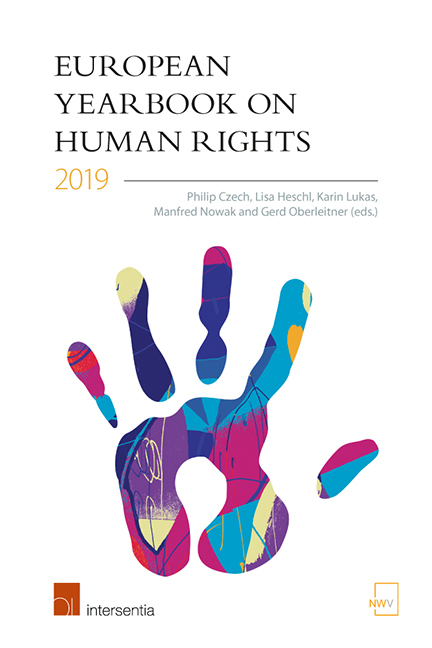Book contents
- Frontmatter
- Miscellaneous Frontmatter
- Editors’ Preface
- Contents
- List of Abbreviations
- List of Contributors
- PART I TOPIC OF THE YEAR
- PART II EU
- PART III CoE
- The Jurisprudence of the European Court of Human Rights in 2018
- Blasphemy and the European Court of Human Rights: A Small Step Forward, a Giant Leap Back
- How Do European Courts Approach the Sensitive Topic of Same-Sex Marriage? An Analysis of the Case Law of the ECtHR and the CJEU in the ‘Catch 22’-Field of Equal Marriage Rights
- The European Court of Human Rights and the Human Rights Model of Disability: Convergence, Fragmentation and Future Perspectives
- The Undermining of Article 6 ECHR
- The Right to a Nationality in Recent Case Law of the European Court of Human Rights and Council of Europe Bodies’ Work
- PART IV OSCE
- PART V REPORTS FROM THE FIELD
- PART VI OTHERS
- PART VII BOOK REVIEWS
- Index
The European Court of Human Rights and the Human Rights Model of Disability: Convergence, Fragmentation and Future Perspectives
from PART III - CoE
Published online by Cambridge University Press: 24 January 2020
- Frontmatter
- Miscellaneous Frontmatter
- Editors’ Preface
- Contents
- List of Abbreviations
- List of Contributors
- PART I TOPIC OF THE YEAR
- PART II EU
- PART III CoE
- The Jurisprudence of the European Court of Human Rights in 2018
- Blasphemy and the European Court of Human Rights: A Small Step Forward, a Giant Leap Back
- How Do European Courts Approach the Sensitive Topic of Same-Sex Marriage? An Analysis of the Case Law of the ECtHR and the CJEU in the ‘Catch 22’-Field of Equal Marriage Rights
- The European Court of Human Rights and the Human Rights Model of Disability: Convergence, Fragmentation and Future Perspectives
- The Undermining of Article 6 ECHR
- The Right to a Nationality in Recent Case Law of the European Court of Human Rights and Council of Europe Bodies’ Work
- PART IV OSCE
- PART V REPORTS FROM THE FIELD
- PART VI OTHERS
- PART VII BOOK REVIEWS
- Index
Summary
ABSTRACT
The adoption of the United Nations Convention on the Rights of Persons with Disabilities (CRPD) marked a paradigm shift in the field of international human rights law, recognising people with disabilities as holders of human rights (as opposed to passive beneficiaries of charity and rehabilitation). Since its entry into force, the CRPD has played a crucial role in the advancement of disability equality within the European human rights system. In the Council of Europe (CoE), the European Court of Human Rights (ECtHR or Strasbourg Court) has slowly begun to apply a standard of protection of disability rights similar to that contained in the CRPD in certain areas, such as with regard to the interpretation of the non-discrimination norm and, until recently, the right to education under the European Convention on Human Rights (ECHR) and its Additional Protocols. This indicates a certain level of convergence between the two legal systems. However, in other fields, such as legal capacity, and, more generally, with regard to the rights of persons with intellectual and psychosocial disabilities, the approach of the Strasbourg Court diverges quite considerably from the interpretation accorded to the CRPD by the Committee on the Rights of Persons with Disabilities (CRPD Committee) in its General Comments. Against this background, this contribution analyses the most recent and, sometimes, contentious case law of the ECtHR on disability, and discusses emerging and future perspectives regarding the influence of the CRPD on the Strasbourg Court's jurisprudence. It contributes to the academic debate on the human rights of persons with disabilities by reflecting on the convergences and divergences that are evident between the protection afforded by the CRPD and the ECHR (as interpreted by the ECtHR), and on the underlying rationale for those convergences and divergences. This contribution analyses the extent to which the ECtHR has shifted towards the human rights model of disability embedded in the CRPD and situates that discussion within the wider debate on fragmentation in international law. In doing so, it ultimately reflects on the willingness of the ECtHR to incorporate progressive international human rights standards into its jurisprudence.
INTRODUCTION
Since the early 2000s and, in particular, after the publication of the 2006 report of the International Law Commission, the ‘fragmentation of international law’ has been a core theme of international scholarship.
- Type
- Chapter
- Information
- European Yearbook on Human Rights 2019 , pp. 261 - 294Publisher: IntersentiaPrint publication year: 2019



